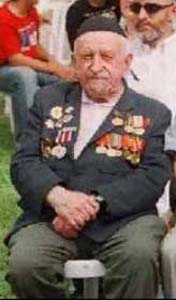

Project «Voices of Jewish settlements. Vitebsk region.»פיתוח קשרי התרבות בין העמים של ישראל ובלרוס
|
|---|
Website search |
|
MainNew publicationsContactsSite mapVitebsk regionMogilev regionMinsk regionZakhar Gelman
|
VICTORY OVER DEATH Moshe Tsimkind.
Moshe Tsimkind.
Moshe Tsimkind, a former partisan, now living in Israel, lost all of his close and distant relatives in the war – they were killed in a ghetto in Plissa. He was supposed to share their fate but he survived. Today he is the only witness of the tragedy in Plissa. At the beginning of the war he was 19. The German troops entered Plissa on July 1st 1941. At first they did not express any hostility towards the local population. A week later most of the men were sent to work on a railroad. Of course, no money was paid to them. However no one predicted the mass murders. One day those men did not return home. Among them was Moshe’s father. The Nazi policemen did not deny having participated in the murder of the railroad workers. …Stepan Metelitsa lived two kilometers away from Plissa. Risking his own life, he offered several Jewish families to hide at his place. Moshe’s school friend Kostia Ivankovich also found Moshe and offered to hide him in their house. Naturally, both Kostia and his parents realized they were putting their lives at risk. It was dangerous for the whole family to leave the ghetto. He also says that many Jews did not even attempt to save their lives. It seemed they had accepted their fate. The ghetto liquidation began on June 1st 1942. The police broke into the houses and grabbed their dwellers. On that day Moshe “was late” for his death – he came home a few minutes after his mother, sister and brother had been forced to leave the house… Moshe decided to hide himself in the attic but one of the policemen noticed him. He ran into the house and pointed the gun at Moshe… and suddenly put it down. It was a young man that used to study with Moshe at school. Only two Jews survived out of 412 Jews in Plissa – Moshe and Cherne-Leya Ginsburg. Her children had been shot in front of her but for some reason she had been left alive. Moshe met her next to the school and told her they had to get out. They spent several weeks in Stepan Metelitsa’s barn. When it became dangerous to hide there, Stepan gave them food and recommended to head for Glubokoye. The Jewish ghetto in Glubokoye had not been liquidated yet. When Moshe realized that staying in the ghetto in Glubokoye was too dangerous he decided to search for partisans. Leya was not strong morally to continue the trip and was killed by the Nazis. After wandering without any luck in the forest for a week Moshe had to find a shelter somewhere because it was getting cold. Thus he made up his mind to go to Kostia Ivankovich’s house. That was the right decision. The family took very good care of him and helped find the local partisans. He spent the rest of the war in a partisan detachment fighting the Nazi occupants. Zakhar Gelman.
|
|||
|
|
Jewish settlements in Vitebsk regionVitebsk • Albrehtovo • Babinovichi • Baran • Bayevo • Begoml • Beshenkovichi • Bocheikovo • Bogushevsk • Borkovichi • Braslav • Bychiha • Chashniki • Disna • Dobromysli • Dokshitsy • Druya • Dubrovno • Glubokoye • Gorodok • Kamen • Kohanovo • Kolyshki • Kopys • Krasnopolie • Kublichi • Lepel • Liady • Liozno • Lukoml • Luzhki • Lyntupy • Miory • Obol • Oboltsy • Orsha • Osintorf • Ostrovno • Parafianovo • Plissa • Polotsk • Prozorki • Senno • Sharkovshina • Shumilino • Sirotino • Slaveni• Smolyany • Surazh • Tolochin • Ulla • Verhnedvinsk • Vidzy • Volyntsy • Yanovichi • Yezerishe • Zhary • Ziabki • |
Main |
New publications |
Contacts |
Site map |
Vitebsk region |
Mogilev region |
Minsk region |